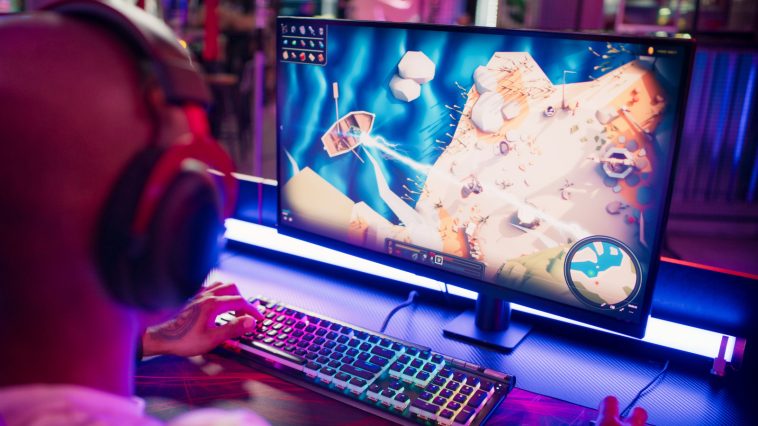Janiecbros/Getty Images
If you’re thinking about buying a used gaming monitor, you’re probably doing so because you hope to save some money. Gaming equipment isn’t cheap, and the cost of peripherals like high-quality monitors can add up quickly, leaving you wondering if you’ll need to start a side hustle just to afford your setup. Depending on what you’re looking for, gaming monitors can be pricey, costing anywhere from $100 for a budget-friendly model to upwards of $1000 for a high-end model.
Advertisement
While there are more than a few affordable gaming monitors that we recommend, if you’re looking for an option with more bells and whistles, like higher refresh rates, better color accuracy, or ultra-wide displays, but don’t want to break the bank, used monitors can be an attractive option. Buying a second-hand monitor can allow you to get more for your money than you might otherwise be able to afford. However, whenever you buy something used, including a gaming monitor, you want to take certain precautions to ensure you’re really getting your money’s worth and won’t be stuck with an unreliable or defective product.
Pros of buying a used gaming monitor
Hananeko_Studio/Shutterstock
The biggest argument in favor of buying a pre-owned gaming monitor is that it’ll save you money, and the savings could be substantial. Buying a high-end monitor can be expensive, but buying it used can slash the price by as much as 50% on websites like eBay. Keep in mind you won’t be getting this year’s model with that type of discount. However, when used under normal conditions, monitors last anywhere from 10 to 20 years, so if that second-hand monitor you’re considering is in good shape, it could have several years of good performance ahead of it.
Advertisement
When you buy a used monitor, it’s often sold as is by the owner, but another option is buying a certified refurbished model. Refurbished monitors are technically used, but they undergo testing and repairs to ensure they meet manufacturer standards. They often come with guarantees, including warranties, like the eBay refurbished program, so if you do end up with a dud, you can return it or get it repaired. You can often save a significant amount of money by buying a refurbished gaming monitor.
Monitors available on the second-hand market are often premium builds with wide color gamuts, high resolution, and fast refresh rates, allowing you to upgrade your gaming experience at a bargain price. If you’re buying used, it usually makes the most sense to buy a high-end model because that’s where the biggest savings are to be had.
Advertisement
Cons of buying a used gaming monitor
Pekic/Getty Images
While there are quite a few benefits to buying a used gaming monitor, there are some drawbacks. If you’re looking for the latest gaming monitors, you’ll likely have a hard time finding them used. Think about the last time you bought a couple of the best gaming peripherals as a gift or for yourself; you or the giftee probably hung on to them for a while. Most people are the same way, so it takes these items a while for them to appear on the resale market. If you buy a used monitor as is, it won’t come with any warranty, and the warranty period for refurbished monitors is often shorter than what you’d get with a new one. So you’re taking on more risk, and there’s always a chance that something will go wrong after the limited warranty expires.
Advertisement
Perhaps the biggest con is that a used monitor was previously owned by someone, and you have no idea how they maintained it. Since it’s used, the monitor may have physical imperfections like scratches or dead pixels, and it may not last as long because of the wear and tear it’s already experienced. Another consideration when buying an older monitor is that its ports may not be compatible with newer devices or lack support for the latest technologies. However, you can often get around this by buying an adapter.
What you need to know before buying a used gaming monitor
Xavier Lorenzo/Getty Images
When shopping for a monitor to take your gaming experience to the next level, there are so many specs, features, and brands to consider that it can become overwhelming pretty quickly. Add to that the prospect of buying a used monitor, and you’ll probably really feel like you’ve got your work cut out for you. While it’s true that shopping for a used monitor will require you to do more homework than if you were buying a brand-new monitor, it can pay off if you keep a few things in mind. Before you do anything else, you want to be sure you’re purchasing your monitor from a reputable seller. Read customer reviews and check their return policy to make sure you’re covered if something goes wrong.
Advertisement
When you buy a second-hand monitor, you know someone used it before you, and that’s why you want to inspect it carefully for any physical damage. You should ensure it doesn’t have dead pixels or screen burn-in because while the monitor will still work, these things can compromise the visual quality and your gaming experience. If you’re buying online and aren’t confident with the pictures displayed, you can ask the seller to send you a video of the monitor turned on and working properly. You also want to make sure you’re really getting a deal on the monitor you’re buying and that the seller isn’t trying to get you to buy a used or refurbished monitor at the same price or only slightly less than you’d pay for a new one.
Advertisement





GIPHY App Key not set. Please check settings